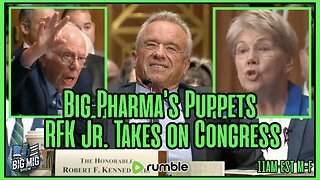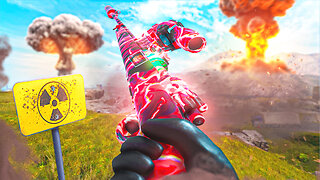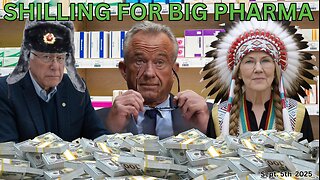Premium Only Content

From Gandhi to Gag Orders: Starmer's Protest Crackdown Implodes
Right, so yesterday it came to pass, that under the stony gaze of the parliament Square statue of Mahatma Gandhi—a global icon of nonviolent protest as he is—twenty-nine people were arrested for the crime of... nonviolent protest. Their placards didn’t scream, their voices didn’t chant. They simply stood, silent and still, beneath a statue of resistance, holding signs that dared to speak a forbidden truth: in relation to their continued support for Palestine Action. For that, a paediatrician, a professor and an 83 year old priest were cuffed like criminals and bundled into police vans under the Terrorism Act. Their only crime being a passionate belief in pacifism and non violence. Welcome to Britain in 2025 under the rule of supposed former Human Rights Lawyer Keir Starmer—a place where even Gandhi were he alive today, would need legal aid.
Right, so yesterday, 29 people stood silently beneath the statue of Mahatma Gandhi in London’s Parliament Square. Their placards were simple, stating that they opposed genocide and that they still supported Palestine Action. Within minutes, they were arrested by Metropolitan Police officers and dragged away under the powers of the Terrorism Act 2000. Among them was an 83-year-old retired priest, Sue Parfitt from Bristol bless her. None were violent. None resisted. Yet all now face the possibility of prosecution for an act that, only days earlier, was entirely legal. It is absolutely shambolic and in that moment, under the shadow of Gandhi’s bronze likeness, symbol of non violent protest as he is, the United Kingdom to say the very least have crossed a line.
The proscription of the nonviolent direct action group Palestine Action marks a historic and dangerous precedent. It exposes a state willing to redefine terrorism in order to protect arms manufacturers, silence critics of Israeli policy, and whitewash their own complicity in the Gaza genocide. Let’s make no bones about it, that is exactly what this is about.
Palestine Action emerged in 2020 as a grassroots direct action network targeting the UK’s ties to Israel’s military-industrial complex, especially through Elbit Systems. Through paint-bombings, rooftop occupations, and logistical disruptions, they aimed to obstruct the production and shipment of weapons used against Palestinians. Their tactics were disruptive, confrontational, and unapologetically bold—criminal acts certainly—but never violent. The group strategically chose facilities with direct connections to the Israeli military supply chain, highlighting the UK's role in enabling violence abroad. Casting light on something the government be that the Tories or Labour today, hated. Their protests included sit-ins, red paint used to symbolise bloodshed, and meticulously planned actions that often led to temporary and in some cases the permanent shutdowns of arms factories.
Despite being prosecuted multiple times for criminal damage, which no doubt they were often bang to rights over, they never stopped, this was something they considered bigger than just themselves. Their campaign attracted global attention, drawing comparisons to past nonviolent struggles against apartheid and militarism.
On 2 July of course, in a moment of absolute national shame, Parliament voted to proscribe Palestine Action under the Terrorism Act 2000. The ban took effect at midnight on 5 July, criminalising support, membership, fundraising, and even public expressions of sympathy. This was the first time in UK history that a domestic, nonviolent protest group was banned as a terrorist organisation. A protest group now labelled as just as bad as the likes of Al Qaeda and Daesh, which is just insane and whether you agree with the premise of their version of non violent protest or not, surely the idiocy of such a legal ruling is obvious. The decision was taken of course in the aftermath of a high-profile Palestine Action protest at RAF Brize Norton, in which these activists apparently caused serious damage to two planes with some red paint and a couple of crowbars, the fact one of the planes was apparently back in the air mere days later does question the actual damage done in which case. Despite the protest involving no threat to human life though – literally threat to the lives of non combatants being the defining characteristic of what terrorism means - the government's response has been swift and severe.
The implications are massive though. It is now a criminal offence to wear a t-shirt, hold a placard, or even share a slogan that suggests support for Palestine Action. The legal threshold for prosecution is perilously low. As demonstrated by the arrests in Parliament Square, even silent vigils are deemed a security threat if they deviate from the state-approved script. This is not the preservation of public safety. It is the suppression of political conscience.
The protest under the Gandhi statue was organised by Defend Our Juries, a civil liberties campaign advocating for the rights of jurors and the preservation of fair trial principles and its worth making that point, because much of the mainstream media are saying they were Palestine Action activists involved and they weren’t. Police had been notified in advance. The demonstration was silent and orderly. Participants stood still, holding placards. And yet, within thirty minutes, 29 individuals were arrested under Section 13 of the Terrorism Act for displaying support for a proscribed organisation.
The irony is off the charts. Beneath the gaze of Gandhi—the apostle himself of nonviolent resistance—immortalised in bronze, overlooking those emulating his methodology were criminalised. The UK venerates Gandhi in its monuments while persecuting those who embody his philosophy. It is hypocrisy on steroids. It is the institutionalisation of a moral void, you could literally describe Keir Starmer himself with those same words.
Section 13 of the Terrorism Act, originally designed to deter glorification of violence, has now been grotesquely stretched to encompass silent vigils. Its broad interpretation makes it a tool of political convenience. It does not measure harm. It measures dissent. And dissent, in this case, is being prosecuted because it speaks truths the government would rather silence: that the UK arms trade fuels war crimes, and that justice for Palestinians demands more than polite petitions.
The arrests were widely condemned by civil liberties groups, human rights organisations, and international observers. UN experts issued a statement warning the UK government not to misuse terrorism laws against peaceful protest. Well they haven’t listened to you. Yet the Starmer government and Metropolitan Police remained defiant, insisting the law had been applied appropriately. What was absent from their response was any reflection on whether the law itself was just.
On the same day as the Gandhi Square arrests, another protest unfolded—this time at London Pride. Activists from Youth Demand, affiliated with climate justice networks and known for their unapologetic stance on various issues, disrupted the parade by throwing red paint over a Cisco-sponsored float. The red paint of course symbolising the blood of Palestinians killed in Gaza, and Cisco was accused of supplying technology to the Israeli military. Protesters glued themselves to the float, halting the parade temporarily and demanding accountability from corporate sponsors.
The legal consequences were different—arrests for criminal damage, not terrorism—Youth Demand not proscribed, yet—but the message was consistent. Both protests challenged the erasure of Palestinian suffering from public consciousness. Both were met with swift suppression. The protesters were removed, the float was cleaned, and the parade resumed, but the message had been delivered: resistance will find its way into every space, no matter how corporate, commodified, or carefully choreographed.
In an era when radical protest is increasingly excluded from public life, the symbolism of red paint staining a float built on corporate sponsorship is both haunting and powerful. It marks a generational shift—younger activists no longer seek respectability, but rupture. They do not ask for inclusion; they demand change.
The proscription of Palestine Action is not just a legal manoeuvre. It is a political statement. It reveals a government that sees anti-genocide protest as more dangerous than the genocide itself. It asks us to accept the criminalisation of nonviolent direct action while ignoring the moral atrocity that compelled it.
Is it legally or ethically defensible to label a group like Palestine Action as terrorist? By traditional definitions of terrorism—the use or threat of violence against civilians to further political aims—the answer is no. The state has chosen to redefine terrorism not by method, but by message. And the message it finds intolerable is this: that Britain is complicit in Israel’s war crimes.
What precedent does this set? If Palestine Action can be banned, then so too can any group that confronts power too directly going forwards: climate activists, trade unionists, anti-racism campaigners. Who will be next? The state has shown it is willing to criminalise not only action but association. Not only disruption but dissent. It is an authoritarian drift cloaked in legal formalism.
Who benefits from this? Certainly not public safety. The beneficiaries are Elbit Systems, arms dealers, and the diplomatic status quo. The truth being shielded is Britain’s material and ideological investment in Israel’s militarism. And it is that truth—not the protestors who speak it—that the state seeks to bury.
The UK’s crackdown on Palestine solidarity echoes past efforts to suppress inconvenient conscience. During the apartheid era, anti-South African protestors were harassed, arrested, and surveilled—but never labelled terrorists. In the US, groups like the Black Panthers and later animal rights activists faced similar repression under the guise of national security. After 9/11, the expansion of terrorism laws globally created a legal grey zone where activism could be conflated with extremism.
But the proscription of a peaceful UK-based protest group marks an escalation. It crosses a red line. It is no longer enough to police actions. Now, the state polices beliefs. It does not matter how peaceful you are, only what you stand for. And if you stand for Palestine, you stand alone.
The parallels are chilling. Governments have always sought to silence those who threaten entrenched systems of power. What changes are the tools and the justifications. In every era, repression is wrapped in the language of security, order, and law. But underneath lies the same fear: that truth, once spoken, cannot be unspoken.
Britain loves to honour resistance in bronze—like Gandhi—but fears it in real life. It celebrates moral courage as long as it is safely in the past. When that same courage appears in the present, it gets handcuffed and hauled away.
The contradiction is staggering. Gandhi broke laws. So did Mandela. So did the suffragettes. Their crimes were civil disobedience. Their legacy is now state property. But their methods, when employed today against British complicity in war, are suddenly intolerable.
We live in a democracy that celebrates protest in the abstract while criminalising it in practice. The aesthetic of freedom is preserved. The reality is suppressed. Bronze statues mean nothing if the values they represent are outlawed.
The Gandhi protest symbolises this contradiction perfectly. It confronts us with a question: What kind of country builds a monument to civil disobedience while jailing those who practice it? The answer, increasingly, is a country more concerned with appearances than principles.
Why is Palestine the red line? Because it exposes too much. It exposes Britain’s arms sales. It exposes the seamless alignment between British diplomacy and Israeli military policy. It exposes the human cost of that alliance. And it demands answers that neither government nor corporation can afford to give.
Palestine solidarity movements do not just challenge policy. They challenge narrative. They refuse the framing of Israel as victim and Palestinians as disposable. They refuse the normalisation of apartheid. They force a reckoning with complicity. And in doing so, they threaten the ideological foundations of Britain’s foreign policy.
This is why Palestine Action had to be banned. Not because it was dangerous. But because it was effective. It targeted the heart of Britain’s defence establishment and succeeded in making visible what was meant to remain hidden.
The UK is now criminalising not only how people protest, but what they protest for. This is not a slippery slope. It is a plunge off the edge of a cliff called democratic integrity.
What happens to a democracy when peaceful protest becomes a crime? When silence is the only legal option? When laws designed to protect against violence are turned against conscience? It ceases to be a democracy at all.
This moment is about more than Palestine. It is about the future of dissent. About whether citizens have the right to challenge power without being branded enemies of the state. About whether moral clarity will be punished or protected.
The message from the Starmer government is clear: solidarity with Palestine is no longer just controversial. It is criminal. And the message from the police is even clearer: they will enforce this regime, not because it is just, but because it is law.
In Parliament Square, Gandhi still stands. He does not move. He does not speak. But his legacy has been betrayed. If he were alive today—holding a placard, opposing genocide, defying unjust laws—he would be arrested too.
This is the moment we are living in: where law is used not to protect, but to punish; where protest is treated not as a right, but a threat; where morality itself appears to be on trial.
Solidarity movements must not be silenced. Civil disobedience must not be surrendered. If the law demands silence in the face of genocide, then the law is wrong.
And it is not those who defy it, but those who enforce it, who will be judged most harshly by history.
For Keir Starmer, he has backed himself into a corner over this, there is no win for him here politically, even more people than already despised him now do, so if you’ve come off the back of this video thinking he’s scored a win here, well rest assured, he hasn’t and you can check out this video recommendation here as your suggested next watch to find out all about that.
Please do also hit like, share and subscribe if you haven’t done so already so as to ensure you don’t miss out on all new daily content as well as spreading the word and helping to support the channel at the same time which is very much appreciated, holding power to account for ordinary working class people and I will hopefully catch you on the next vid. Cheers folks.
-
 LIVE
LIVE
The Big Mig™
3 hours agoBig Pharma's Puppets: RFK Jr. Takes on Congress
8,184 watching -
 LIVE
LIVE
Total Horse Channel
11 hours ago2025 Reno Snaffle Bit Futurity | Friday
21 watching -
 26:40
26:40
Rethinking the Dollar
1 hour agoPeter Schiff: "Trump's Economy WORSE Than Biden" | Morning Check-In: Let's Talk...
151 -
 LIVE
LIVE
Badlands Media
6 hours agoBadlands Daily: September 5, 2025
4,192 watching -
 24:00
24:00
Bearing
3 hours agoThe Week LIBERALS Thought TRUMP DIED 💥 (And Went INSANE) 🤣
3.56K11 -
 LIVE
LIVE
GritsGG
1 hour agoWin Streaking!! 🫡!
44 watching -
 1:41:36
1:41:36
Dear America
2 hours agoWelcome To The Dept Of WAR! RFK DESTROYS The CDC! + Should Trans Own Guns?!
71.1K49 -

Matt Kohrs
10 hours agoStocks Hit Record High, Breaking Jobs News || Live Day Trading & Analysis
12.3K -
 LIVE
LIVE
Wendy Bell Radio
6 hours agoSchilling For Big Pharma
7,310 watching -
 1:09:42
1:09:42
Crypto Power Hour
3 hours ago $0.31 earnedMemecoin Masterclass
8.64K5